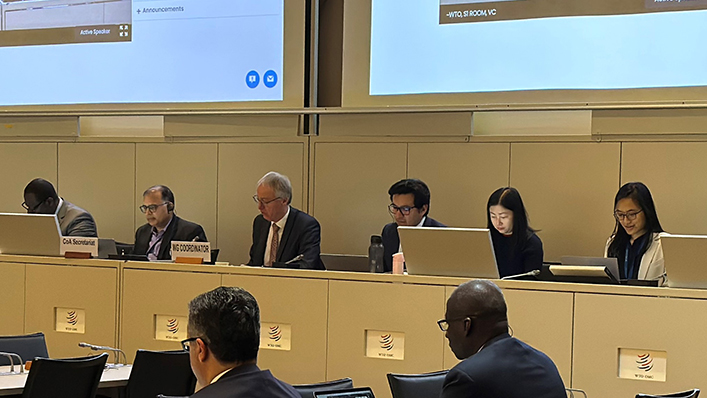
The working group serves as a dedicated platform under the Committee on Agriculture to address the food security concerns of LDCs and NFIDCs as part of a work programme launched as a follow-up to the mandate given by the 12th Ministerial Conference (MC12) in June 2022. Marcel Vernooij from the Netherlands, coordinator of the working group, facilitated the discussion.
Thematic discussions on financing
During the workshop on 28 February, prominent international organizations presented their ongoing efforts to address food insecurity in countries most severely impacted by the crisis, particularly regarding financing projects and capacity-building activities. International financial institutions such as the World Bank, International Monetary Fund and International Fund for Agricultural Development participated in the meeting for the first time. Additionally, some members also shared their experiences in dealing with the repercussions of volatile food markets.
Members welcomed the rich and thought-provoking information that shed light on the gravity of food insecurity in LDCs and NFIDCs, which are facing escalating import bills and a massive financial gap to meet the rising costs of food, fertilizer and energy.
Acknowledging the budgetary and technological limitations of LDCs and NFIDCs, members emphasized the need to combine immediate financial assistance with long-term structural changes in the agriculture sector of these countries.
Many members expressed a keen interest in exploring ways to improve the financial services infrastructure to boost local agricultural production and productivity. This includes enhancing general services such as research and development as well as specific services like disease control, market information and infrastructural investments. There was a call to continue these discussions to identify effective solutions that can make a meaningful impact in addressing the persistent food security crisis.
Some members emphasized the continued importance of trade as a crucial vector of ensuring food security and the need to refrain from implementing restrictive border measures.
Others pointed out that international institutions and other actors have been operating in silo, emphasizing it is critical to strengthen cooperation and work together to achieve meaningful progress.
Many members stressed the need to deliberate on the specific role that the WTO should play in global efforts to combat hunger, with some suggesting the WTO should focus on its expertise in trade-related matters, leaving financing issues to other competent financial institutions. Members agreed to explore these issues further in future meetings.
First review of questionnaire results
During the meeting, the WTO Secretariat shared the initial findings from the needs assessment questionnaire, which was launched in December 2022. The summary report included responses from 84 members and focused on key questions related to the specific needs of LDCs and NFIDCs, existing flexibilities in WTO agreements and decisions, and suggestions for improving transparency mechanisms in the domain of food security.
Members expressed appreciation for the detailed summary of respondents’ views and the valuable information gathered through the questionnaire. Some encouraged more LDCs and NFIDCs to participate in the survey to gain a better understanding of the current situation.
Some members requested additional data to better understand why the existing flexibilities are not sufficient to meet the needs of LDCs and NFIDCs. In response, other members argued that the current emergency situation requires additional policy space, which is not adequately addressed by existing flexibilities that are designed to address medium and long-term food security needs.
Several members emphasized the importance of filtering a raft of priorities proposed by members in order to identify a set of practical measures that can be used to make final recommendations on the issue.
Some members expressed a willingness to share the original version of their responses. However, a few members expressed reservations, stating that it may be more productive to focus on common challenges rather than individual experiences.
Mr Vernooij acknowledged that the questionnaire was not the only source of discussion and highlighted that members would continue to discuss the evolving summary report on the questionnaire in the next meeting.
Next meeting
At the meeting, members suggested a wide range of ideas for the agenda of the next working group meeting, which is scheduled for 17 April. Some of the proposed topics included enhancing agriculture and production resilience, addressing export restrictions, capacity-building initiatives, transparency in food markets, and continued discussions on agricultural finance.
More
All presentations from the Workshop on Financing held on 28 February will be accessible on the event’s dedicated page.
More information about the Work Programme on Food Security for LDCs and NFIDCs is available here.
Share
Reach us to explore global export and import deals